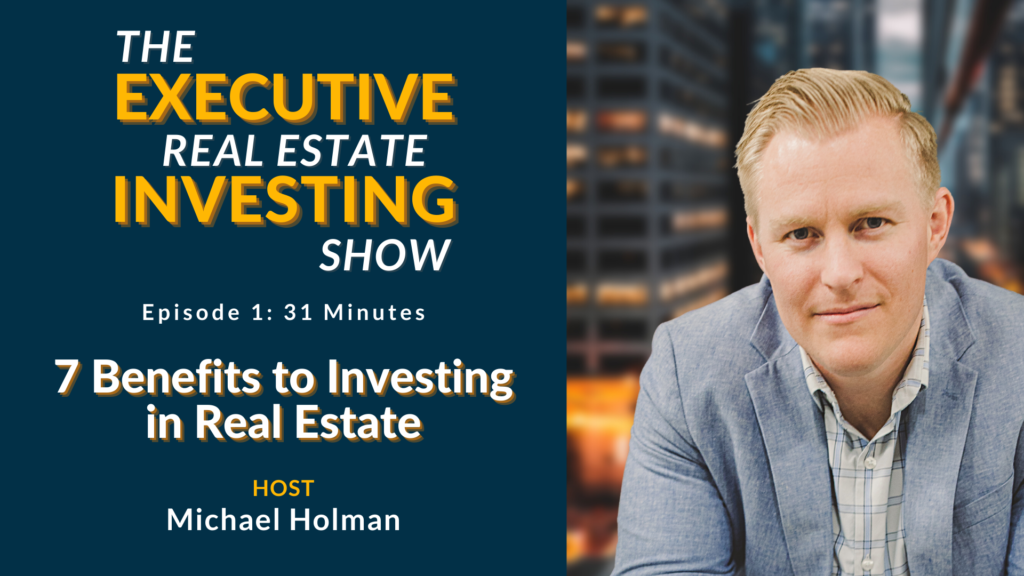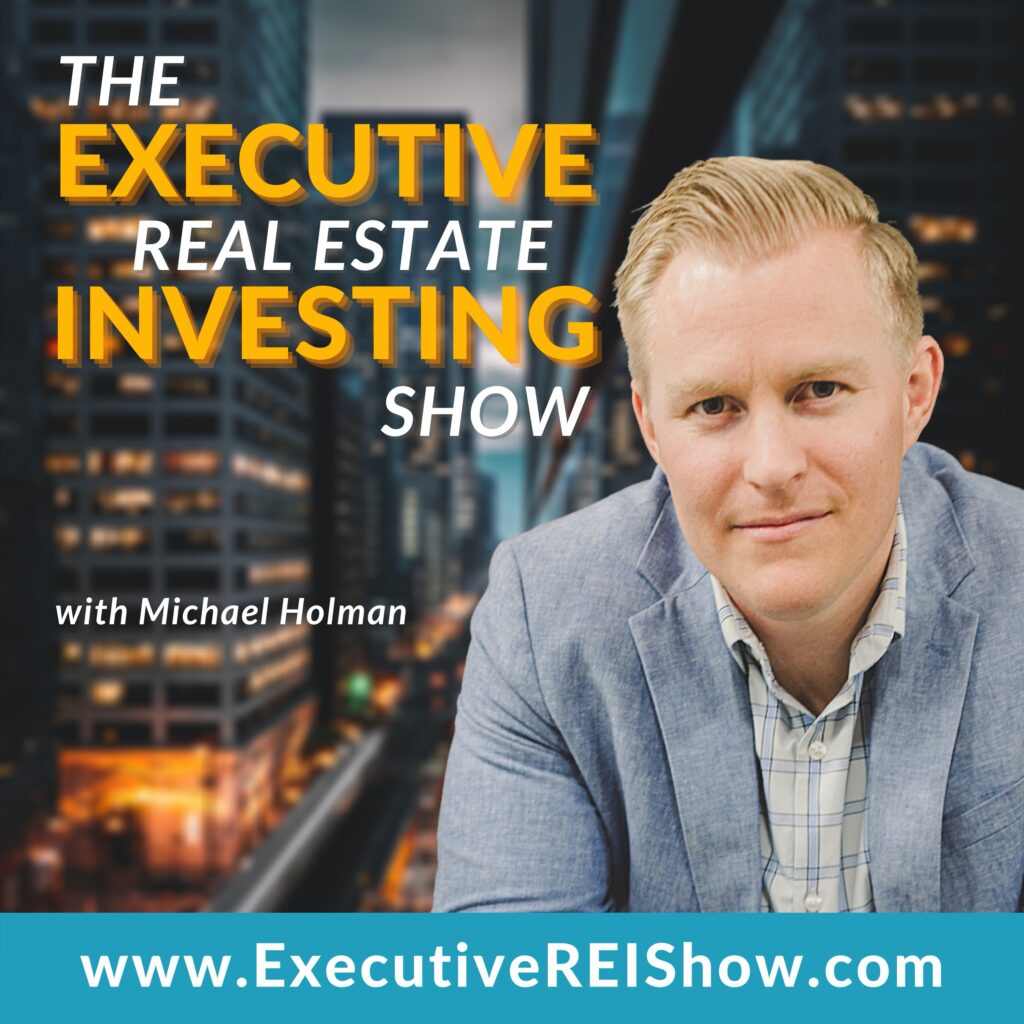
The executive Real estate investing Show
EPISODE 1
7 Benefits to Investing in Real Estate with Michael Holman
- June 7, 2021
EPISODE SUMMARY
This week on the first episode of the executive REI Show, podcast host, Michael Holman covers extremely simple but also extremely powerful components when investing in real estate. He breaks down the 7 benefits of investing real estate as opposed to some other investment options. This information is helpful for the new real estate investor or a great reminder to the seasoned ones.
- Cash Flow
- Leverage
- Diversification
- Tax Benefits
- Passive Investing
- Multiple Streams of Equity Growth
- Low Volatility
Michael also discusses 3 aspects that make up your return in real estate investment: cash flow, equity buildup, and appreciation.
LISTEN TO THE PODCAST HERE

The Executive Real Estate Investing Show Podcast
EP 01: 7 Benefits to Investing in Real Estate with Michael Holman
Listen on
READ THE TRANSCRIPT HERE
Note: Audio transcription has been automatically transcribed
Welcome to the Executive Real Estate Investing Show. This podcast is for you, the busy business owner or executive looking to create generational wealth. Here, we’re going to show you how to do that through real estate investing. Through multi-family to industrial, and everything in between. You will become a real-estate investing expert. And now, here’s your host, Michael Holman.
Welcome, everyone, to The Executive Real Estate Investing Show. I’m your host, Michael Holman, and we are on our very first episode of The Executive Investing Real Estate Show, really excited.
Really the reason why we started this podcast or why we chose to start this podcast is we just found that most people, especially business owners and business executives, just don’t understand what they’re doing when it comes to real estate investing. Not to say that they’re not capable, but they just get so busy. Everyone just gets so wrapped up, and this goes really for anyone, not just business owners or business executives, but really anyone.
We just find that there’s a lack of understanding and a lack of knowledge when it comes to real estate investing. We’re a big proponent of the classic phrase, “Invest in what you know.” Everyone’s heard it in investing. Everybody who’s listened to that or invests a lot knows what that means, and we are very, very big proponents of that.
So, that’s why we created this show. We just want to provide real raw investing experiences, investing knowledge. We’ve been doing this for a long, long time. We’ve been in business over 40 years.
Just to introduce myself a little bit, like I said, I’m Michael Holman. I am a VP at Overland Capital. Overland Capital is a subsidiary of Overland Group, and Overland Group is a fully integrated real estate company. So, we do development, construction management, investing. Really everything that involves real estate, we touch in some form or fashion.
I’m specifically over development and capital markets, so I take care of a lot of the work prior to construction. That’s me, and then also, I’m in charge of making sure that all of our projects are financed, and we have all the capital needed so that when we start construction, we can just roll without any worries or without any troubles regarding financials.
My background, I came out of school, working for Ernst & Young, one of the big four accounting firms, as a CPA. So, I did that for a little while. I audited a couple of big real estate companies, and then I came over here and have been doing development in capital markets ever since and have never looked back. There’s a lot of reasons why I’m going to tell you that I never looked back as much as I loved that life. I love real estate. I love real estate investing, development. I love everything surrounding that.
A little bit about who the company is just to kind of give you an idea of who we are. My company, Overland Capital, we currently have $50 million of assets under management, with about $120 million currently in the development pipeline. So, we’re really excited. We anticipate about $60 million of that going under construction here in the next couple of months.
So, really excited, really pleased with everything that’s going on. But like I said earlier, we started this podcast and these shows so that we can really portray our knowledge and convey our knowledge and understanding of real estate and real estate investing to the everyday person. There really are a ton of benefits, and we’re going to go on that.
But first, I want to start with a quick executive tip. So, one of the things that we’ve been working on lately, we have a 240-unit multi-family apartment complex that is about to start construction here in a couple of months, hopefully, a month or two. One of the things that we have learned and that we found is we’re working with lenders. So, this is a big project. Altogether, we’re going to be getting loans in the amount of around $45 million, $40 to $45 million. For those of you who are just getting into real estate investing, we’re going to talk about leverage here in a little bit, but leverage is really important, and lenders are really important.
One of the executive investing tips that I have for you is if you are getting a loan on your real estate, which I highly recommend for a lot of reasons, but if you are getting a loan, make sure you treat your lender like gold. It’s really tricky because it’s kind of an adversarial relationship almost. They’re looking for all the reasons not to do the deal, but they also want to be a part of the team. But my advice to you, make sure you treat your lender like gold because that will pay dividends. Lenders take in most of the capital needed to invest in real estate.
A couple of things that we want to talk about today, we’re going to keep it really broad today, but we just want to go into some of the main benefits of investing in real estate. These are things that, if you’ve been in real estate for a long time, are extremely, extremely simple, but they are also extremely, extremely powerful. Most people in the world don’t understand that, and there’s a variety of reasons.
I mean, I was talking; I have a friend who is a dentist. He owns his own practice, and we started talking about investing. He mentioned to me; he said, “You know what? I don’t know what to do. I don’t really understand it. I just throw all of my investments into this target fund, retirement mutual fund, and that’s all I do. I don’t know what else to do.” And I almost pulled my hair out. I mean, anybody who’s read Tony Robbins’ “MONEY Master the Game,” you start cringing at the thought of those target-date mutual funds because there are so many fees that are related to them. They just kill your return.
But this brought up a good point. I mean, people just don’t even understand, right? I mean, especially business owners, business executives, you get so good at what you’re doing, and you just don’t realize that there’s these other options out there to just exponentially increase your investing power and your investing return and take you to financial freedom even quicker than you ever even imagined or ever even dreamed.
So, we need to go over some of just the basic concepts of why investing in real estate is so powerful. So, the first one is cash flow. This is something that pretty much everybody who invests in real estate; this is almost one of the first things that come up—cash flow, cash flow, cash flow. You hear some of the big gurus and the big wigs in real estate investing, and they’ll have cash flow hats and shirts and all sorts of things. It’s because it’s so powerful. I mean, cash flow, on a good real estate investment, I mean, it can be anywhere to six to ten percent on average.
Now, let’s contrast that to the stock market, which their cash returns are abysmal. So, in preparation for this, I actually went and looked. I have a TD Ameritrade account. I got a few stocks in there, and I said, “I’m going to go see what my cash return is on my Stockwell.” I went in there. I had a $200 stock, okay. I checked, and last year, so that’s 2020, they paid me a dividend, an annual dividend, for the entire year of about $1.50. You heard me right, $1.50. That’s a 0.75% cash return. That is awful. That is terrible. You look at a cash return on a real estate investment, 6%, 10%, you are infinitely better. I mean, you’re ten times better just on your cash return than you would be, say, investing in stocks or, heaven forbid, those awful target mutual funds.
So, cash return is one of the main reasons, cash flow, cash return, it’s a huge, huge reason why people invest in real estate, and it’s an important thing to know. Now, depending on who you are and what your goals are, cash flow might be the most important thing, or it might be less important.
I mean, if your main goal is, “Hey, I’m looking to get to retirement. I want passive income as quickly as possible.” Then, yeah, focusing on cash flow, cash return is probably really important. If your goals are, “Hey, I’m looking to–I’m in an accumulation stage, right? I’m a little bit younger, or I’m not looking to retire in the next five to ten years. I’m looking to just accumulate as much in investing power as I can and investing capital as I can.” You know there’s other things that we might want to look at, but cash flow, cash return is a really good, really basic measure for real estate investing, and it’s just one of the reasons why real estate investing is so powerful.
Now, I told you earlier. I gave you my executive tip on treating your lenders like gold. Well, that’s because that leverage is the second really, really powerful thing in real estate investing. Leverage does so many things. I mean, it amps up your returns infinitely, and what I mean by that is if you have, let’s say, you have $100,000, right?
You’re going to invest in real estate for $100,000. Well, if you were to take that and you were to go invest it in a stock, you’re going to get $100,000 worth of stock, right? Your return is going to be whatever it’s going to be, but you have $100,000 of investing power.
Now, on the flip side. Let’s say you have $100,000, and you leverage that $100,000, and you purchase a $400,000 real estate investment, right? Let’s say maybe you bought a single-family home or a townhome that you rent out. Maybe it’s part of a syndication that’s leveraged. Whatever the case may be, you leverage $300,000. Well, your $100,000 investment just turned into $400,000 of purchasing power, and that $400,000 is what you’re getting your return on. We just talked about cash return, right? Let’s say you find a stock that’s just off the charts good—ten percent return. Never heard of it, but let’s say in Michael’s hypothetical world it exists, a ten percent return on the stock. Well, that would get you $10,000 a year. That would be fantastic.
By the way, if you have a stock that gets you a 10% cash return, I’m not talking about just that stock increases in value. I’m talking about cash return. Then call me right now or email me right now, but back to our examples.
So, you have $100,000, 10% return, $10,000 in a stock. Okay, fantastic. Now, you take that $100,000. You invest it in real estate. It goes to $400,000. You purchase a $400,000 asset, same 10% return. That’s $40,000. That’s exponentially better than the $10,000 you get with the stock.
Now, I know what you’re saying. If you’re a mathematician, you’ve been doing real estate investing forever. You’re saying, “Michael, wait. Wait a minute. Wait a minute. Wait a minute. You didn’t account for your debt service.” Well, I know. Okay. But your debt service almost never, unless you get a really expensive loan, your debt service almost never is going to make up for that difference between the $10,000 and the $40,000. So, your $40,000 cash stream, yeah, you’re going to have to pay some debt service. You’re going to have to make some loan payments on that. Call it $20,000. You’re still sitting at $20,000 versus $10,000.
Leverage people. It’s a very, very, very powerful tool in real estate investing, and by the way, some of you too might be saying, “Well, I’ve heard of people getting loans on stocks. Why don’t I just do that?” Well, I got a lot of reasons why you shouldn’t do that, but to be honest, the thought just makes me cringe, and have you ever tried to do it? It is not easy.
One of the founders of our company, he always is telling the story how he had a bunch of stocks, and he said, “Well, I have $100,000 worth of stocks, and I’m going to go loan against it, and I’m going to go buy something else. Trying to get that loan was next to impossible, and this isn’t somebody who didn’t have any cash or any net worth or anything like that. Banks, lenders, they just don’t like to do it because they understand how risky and how volatile stocks are. So, leverage is the second thing.
Number three. Our third benefit of investing in real estate is diversification. Diversification, in my opinion, is a key to any successful portfolio. I’m not saying that you have to have a hundred percent of your assets in real estate. I am a real estate professional. I do this day in and day out, so yeah. I have a lot more of my assets in real estate than probably the average person.
But I actually just read a really interesting news article. What it was, is it was this really famous group of ultra-high net worth individuals, and you want to know what the number one bucket in their investing portfolio was? Real estate. Absolutely, real estate, followed by private equity. Stocks or public equity didn’t even come until third on the list. Real estate and diversifying into real estate is super, super important, and I guarantee, the more you start looking at it, and the more you start researching it, you’re going to realize this is what wealthy people do. If you’re one of those people that have sat there and said, “I don’t understand what all these wealthy people are doing that I’m not doing,” well, if you’re not investing in real estate, I can tell you, step one, invest in real estate because that’s what they’re all doing. Okay.
Now, we’re going to go on to our fourth benefit of investing in real estate, and that’s tax benefits. And people, I could spend, and I probably will here in the near future, I could spend hours and hours and hours on the tax benefits of real estate investing. I mean, people have written entire books about real estate investing and the tax benefits surrounding them.
I’m just going to talk about a couple of the things. I’ll tell you right now, without going into too many details. What if I told you that you could make an investment, get cash, and pay no taxes? Sounds too good to be true? Well, it’s not. It’s called real estate investing, people, and it’s called depreciation. That is one of the biggest fundamental aspects of real estate investing.
An example of that, you can go in, and you can buy an asset. You can receive cash. You take your income, you minus all your expenses. You see, you get your net cash. Maybe you have a loan on it. You take out your loan service, and you get to your net cash number, that number that comes to you every single month.
Well, according to the IRS, there’s another expense in there that you could include on your tax returns, depreciation. But guess what? Depreciation is a non-cash expense. There is no cash changing hands. Depreciation simply states that your asset becomes less valuable over time. Therefore, it’s an expense. So, you depreciate this asset over time, and there’s all these tricks and techniques that you can speed it up however you want, and you can literally, for a lot of years, receive income on a real estate investment and literally pay $0 in taxes. Amazing. Amazing, amazing, amazing.
One of the other main tax benefits—1031 exchanges. If you’re new to real estate investing, you probably haven’t heard it, but if you stay in real estate investing for a while, you’re going to hear about it again and again and again and again and again. We do a ton with 1031 exchanges.
You’re simply, you’re just allowed to roll your investment. As long as you’re investing in real estate, you can buy and sell, and buy and sell, and buy and sell all you want, and you’re deferring all those capital gains. I mean, we have investors that have literally built small fortunes deferring taxes for years and years and years and years. It’s a beautiful thing, people. Real estate investing is a beautiful, beautiful, beautiful thing. Unless you love paying taxes, then you know what? Maybe real estate investing is not for you, but I came from a CPA background. I love my country, but I also have an obligation to pay the least amount of taxes as legally possible.
Number five and our benefits of real estate investing. You have the opportunity to passively invest in real estate. What that means is depending on the type of real estate investing you do, you can make an investment. You can literally do nothing, right? In some investments, like we do a lot of real estate syndications. We pull a lot of investors together, and most of these people don’t want to be active. A lot of them are business owners, business executives. They want to focus on selling software. They want to focus on their painting. They want to focus on all these other things besides real estate investing, right? They don’t have time to sit here and manage and clean toilets and fix light bulbs in their rentals day in and day out.
So, we do a lot of real estate syndication, and these people, literally, they sign a few documents saying, “I understand the risks of real estate investing.” They fund their money, and they pretty much do nothing else after that. We literally do all the work, and we send them a check month in and month out. Amazing, right? It’s so simple yet so powerful, right?
I mean, anyone ever tried to be a day trader? That is about the least passive thing you can possibly be doing, and I’ve never done it personally, but I’ve known a lot of people who’ve tried day trading. Bless our hearts. Most of them have done nothing but lose a bunch of money. The adage is buy low, sell high.
I had one friend who did a lot of day trading, came back to me, and said, “I was a really, really good day trader.” I said, “Oh, yeah? What was your secret? What’d you do?” He said, “You know what? I had this unique technique that I used, and people love me for it. Stockbrokers love me for it. I would buy high, and then I’d sell low, and I just lost a ton of money.”
So, passively investing in real estate is amazing. There are benefits to active. There’s benefits to passive, but if you’re busy and you just don’t have the time to really focus and analyze markets and analyze assets, being able to passively invest and having that opportunity, amazing.
We’re going to go to our sixth point of the benefits of real estate investing. Number six, multiple streams of equity growth. What I mean by that is in real estate, we talked about cash flow. That is only one aspect of your return in a real estate investment, and to be honest, I do a lot of development. Cash flow in a real estate development investment is actually one of the smallest aspects of a return.
So, there’s two other main ones, and some will argue there’s three more or whatnot, but we’re going to keep it simple. There’s two more. We’ve talked about cash flow, number two, equity buildup. We’ll get into that, and then third is appreciation.
Equity buildup is pretty simple, and almost all of us, who have ever owned a home, have experienced this, especially multiple homes. So, using the example of a home. You take out your mortgage. You put your down payment in, and you make your payments every single month. Well, a part of those payments, every single month, is going to pay down principal. Some of that payment is going towards interest. Some of that payment is going towards principal, right? Well, when you’re paying down your principal, that means that you have more equity, right?
I mean, I just experienced it. I literally, I just sold my home. We’re building a new home ten minutes away from where I was living previously, and it was amazing. It felt like Christmas. We sold our home, but we had been paying on it for years and years and years, and we had all this equity in the home. All of a sudden, they just hand you these checks, $100,000, $200,000, $300,000, and say, “Here. This is the money you made on your home, and this is the equity that you’d accumulated.”
Same thing happens in a real estate investment. That equity buildup, when you’re paying those loans, it’s paying down your mortgage, and it’s building up your equity. That’s the second thing, and the third one that we talked about is appreciation.
Okay, in my world, this is the number one aspect of a return that exists in real estate development. So, just over time, real estate becomes more expensive and more valuable, right? I mean, you want an easy example? Just look at home prices in the last 50 years. I still hear stories about my parents and my grandparents buying houses for like $20,000, $30,000. Has anyone in the last two or three years purchased a home for $20,000 or $30,000? I don’t know. There’s probably someone out there that’s found it. Bless their heart. They probably spend a hundred hours doing it, but home prices are significantly higher.
I mean, where I’m at, I think I just read the average home price was like $400,000 or $500,000 recently. That was not the case in 1970, so real estate appreciates, and that’s just a small example. I mean, homes might appreciate 4% or 5%, but when you get into new development and big multi-family projects, I mean, it’s exponential what can happen.
So, I mean, let me give you an example. I talked about that 204 units they were developing. It’s in Arizona, and we’re about to go under construction. Well, our costs on that entire project is going to be roughly $55ish million. Okay. I’m rounding for ease. Well, we just had an appraisal that came back saying that same $55 million project that we’re building right now when we’re done building it, even if we have no tenants in this building, just when we’re done building it, is worth $76 million. That same building once we get all the tenants in it and lease it up, $79 million, I mean, that’s a $25 million increase, and it’s because we took raw land and we developed it. We constructed something on there, and there’s an inherent value to doing that. A lot of small business owners understand this perfectly.
I mean, it’s the same idea as when you sell a product. In college, they always talked about widgets. Well, people buy all these widgets from China and Thailand, and they buy them for $5. They put all their cost together, and they package it all nice, and maybe they spent $10 on everything, and then they go around and sell it for $20. Well, it’s the same thing in real estate that we’re doing. So, appreciation, like I said, I could harp on that all day long. In my world, that’s a big deal.
Now, for a lot of people who do value add, who are purchasing existing buildings and then trying to fix them up and then rent them out for a little bit more, the fix and flip of the apartment world, or those who are long-term holders. They might focus more on cash flow, and that’s fine. I mean, our cash flow is still in the 6%-7% range. It gets up to 8%, 9%, 10% if we held it long enough. But like I said, in my world, appreciation is most important thing, but those are the three ways, or the three things, that make up your return in a real estate investment.
Now, I just want to make a comparison back. So, you remember when I said the $200 stock that paid me $1.50 in a dividend in an entire year, right? That was like the only return. I had a little bit of appreciation in the stock, and that was it. Well, in a real estate investment, you have the cash flow, which is already insanely better than any stock or mutual fund, and then you combine equity buildup to that. On top of that, you add appreciation and your returns– I mean, the average return in the stock market. I remember in college, we had a lot of smart professors. They would always say, “The average, risk-free return in the stock market over the entire life. There’s an argument of whether it’s 6% or 8%, but it’s somewhere in that mix, 6% to 8% of real estate investing. I don’t do a deal unless I’m at least 15% on a new development, oftentimes 17%, 18%, 20% return on investment. Oh, and by the way. My return is also adjusted for time, which means the longer the investments out, the lower the return. If you take my annualized return, like all the stock returns, too, I’m more like 25%, 26%, 27% return. So, you see that real estate investing just destroys stock investing. So, those are the first six.
Now, the last one is also really important, and based on what’s happened lately, this is also a really, really important one. So, real estate, in general, has a low volatility compared to a lot of other investments. This is our final one, and I saved this for the end at this time specifically. Maybe this doesn’t make sense if you’re listening to this one or two years down the road, but sitting here in early 2021, we just had GameStop that just went gangbusters. A bunch of people on Reddit who managed to move a market. That’s a whole other topic, but nobody on planet Earth thought GameStop was what it was worth when it got to its peak here in early 2021, but there’s so much volatility all over the place. I mean, you invest in a stock or mutual fund, and it’s like up, down, left, right, and if you’re trying to reduce that volatility, well, then all your return goes away because you’re stuck with all this diversification. It’s like, well, I can make 4% less risky, or I can potentially make 10%, but I’m taking on an exorbitant amount of risk. Now, I’m not saying, and don’t get me wrong here. I’m not saying that there isn’t risk involved in real estate investing. There 100% is risk, but there is lower volatility overall. You don’t get these wild swings. Maybe you can look back at 2008, 2009 and say, “Oh, well, there was wild swings there.” Okay. But if you just wait a few more years, things are right back up to where they were pre-Great Recession.
The other amazing thing and why real estate is so low volatility is because it’s an illiquid asset. What that means is you don’t just go on like E-Trade or Charles Schwab or whatever you do. You don’t have a stock, and you press “sell,” and as long as it’s market hours, all of a sudden, you just have money. It just appears. It’s instantaneous.
Well, real estate is not a liquid asset. You make a real estate investment; you’re generally in it for the long haul. I mean, it’s years. You put it in; you don’t expect your money back for years. The advantage of that is you don’t deal with the volatility that happens day-to-day. I mean, I had a friend who invested in GameStop during this whole thing, and he came back to me, and he said, “Mike, I didn’t sleep for almost three days because I couldn’t stop thinking about it. I was checking my stock account 10, 12, 14, 20 times a day. Because every single time I looked at it, it was $10 up or $5 down or $30 up or $50 down.” There’s a beauty in the illiquidity of real estate. You don’t deal with all of those, and because the market doesn’t move so dramatically, so quickly, it’s easier for real estate managers to time the market. When things go up, it stays up for weeks, months, years. When it goes down, it stays down for weeks, months, years. It often bounces back, but there’s a beauty in the illiquidity. It takes away the feeling of volatility throughout the market. Like I said, volatility, it still exists in real estate, but it is exponentially lower in real estate—I would argue with just about anybody—than almost any other investment especially, the stock market.
Thanks, everyone, for joining us on our very first episode of The Executive Real Estate Investing Show. If you are interested in passively investing, go ahead and go to our website, www.OverlandCapitalCorp.com, and from there, you can fill out our investor application. We’ll get in touch with you.
Real estate investing, people, it’s really important. It’s really beneficial. If you don’t know how to do it, you need to start learning how to do it. If you know how to do it and you haven’t done it, it’s time to take action. All right, we’ll see everyone next time.
Thank you for listening to The Executive Real Estate Investing Show. Ready to learn more? Go to ExecutiveREIShow.com for more episodes and resources to help you create generational wealth through real estate investing. That’s ExecutiveREIShow.com.







